Hamas has accepted a ceasefire deal proposed by Egypt and Qatar. But Israel says, it will continue to operate in Gaza despite Hamas’ response to the deal. So, the drama will go on for some times.
It is a very sad saga, because an official familiar with Israeli thinking says Israeli officials are examining the cease-fire proposal approved by Hamas. But the official warns that the plan approved by Hamas “is not the framework Israel proposed.”.
The last hours seem bleak, and Netanyahu’s madness and arrogance have left the leaders of the Middle East with no choice but to confront him, as he rushes with the utmost foolishness towards his “final battle” against the residents of Rafah. The Palestinian resistance shows a tremendous desire not to surrender, and Hamas confirmed, through one of its leaders, Musa Abu Marzouk, its confidence in the imminent victory over the occupation forces, and that it will dedicate its victory to Egyptian President Abdel Fattah al-Sisi and the Arab leaders. There is a state of anxiety after Netanyahu dashed hopes of reaching a ceasefire settlement and starting a political process to end the Israeli occupation and bring peace.
The occupation government chose to blow everything up in the last moments. Hence, Türkiye decided to join South Africa in its case against Israel before the International Court, and to suspend its commercial transactions with Israel. Turkish lawyers filed a lawsuit against Netanyahu before the International Criminal Court, accusing him of committing genocide in the Gaza Strip.
This was triggered by Netanyahu’s impossible conditions for ending the war peacefully, which stipulated disarming the resistance, keeping occupation forces inside Gaza at points he decided, seizing the crossings, and deporting the leaders of the resistance, and the Qassams in particular, or else returning to war. Under these conditions, Qatar, Türkiye, or any Arab country cannot pressure the movement. Rather, it pushed the leaders of the region to become unruly against it and forced Saudi Arabia to adhere to the establishment of a Palestinian state before any normalization with Israel.
These developments came amid a rare moment in which all regional powers seem united in rejecting escalation in the Middle East region. An understanding has evolved among them about a “political settlement” based on a two-state solution, and the establishment of a Palestinian state on the 1967 borders, with East Jerusalem as its capital.
Despite this, it was remarkable that Hamas and Iran announced their acceptance of this political settlement, and this is considered a major step that brings together the resistance camp and the moderation camp. Do you think this is just a passing moment, or a maneuver, or is it a real development, at least among the active powers: Egypt, Saudi Arabia, the Emirates, Türkiye, Iran, and Qatar?
Will these desires withstand the conspiracies and stubbornness of Israel, and will Washington accept them or insist on deepening the differences between these countries and wasting the “rare opportunity for reconciliation” that was achieved after a heavy price and a long time?
Detailed information was provided about the Egyptian plan to resolve the impasse and stop the crazy Israeli war against the people of Gaza, and this coincided with an intense campaign to market the “huge deal” offered by Washington. Things do not seem easy, but there are obstacles and a question mark about achieving the truce and the success of the deal.
You see what the scene looks like, what the details are, and how Cairo, Ankara, Tehran, Riyadh, Israel, Hamas, and Qatar are moving.
Intense movements and sudden statements
In recent hours and days, the region has witnessed the circulation of a lot of information, leaks, and surprising statements that reflect the scale of the effort to contain the Gaza crisis, stop the escalation, and not launch the Israeli attack on Rafah, deliberations regarding a truce in Gaza, the fate of Hamas leaders, and a political settlement that opens the horizon for the two-state solution. The establishment of a Palestinian state on the 1967 borders with East Jerusalem as its capital. Perhaps the most notable observation is that most of the movement was initiated by the active countries in the region, especially Egypt, Türkiye, Qatar, Saudi Arabia, and Iran.
One of the most prominent scenes in the recent period was the increase in Egyptian-Turkish coordination in the Palestinian file. Informed sources indicate that many things will crystallize after the upcoming visit of President Sisi and his meeting with President Erdogan. They point out that the visit of Egyptian Foreign Minister Sameh Shoukry to Istanbul, highlights the extent of Turkish-Egyptian coordination.
Egyptian-Turkish format
The region appears to be on the cusp of a new phase, the most prominent features of which are work and coordination between Cairo and Ankara.
After President Erdogan’s visit to Egypt, the Egyptian Foreign Minister came to meet his Turkish counterpart to coordinate on the conditions and issues of the region, most notably the conditions of Gaza and the Palestinian issue. Arrangement for the upcoming visit of President Sisi to Türkiye was also discussed, which inaugurates an advanced stage in the relations of the two countries.
It is worth noting that the positions of Ankara and Cairo on the Palestinian issue were identical. Turkish Foreign Minister Hakan Fidan confirmed that the West’s support for Israel and its occupation of the Palestinian territories is the main reason for instability in the region.
During his meeting with Shukri in Istanbul, he warned that if the crisis in the region was not contained, it would spread to the streets of Western countries and the rest of the world. Fidan said, “Our priority must be ending the occupation of the Palestinian territories and the two-state solution.”
In turn, Shukry expressed Egypt’s concern about the expansion of the conflict in the region, calling for “problems to be always resolved through dialogue and within the framework of international legitimacy.” He said that “a political path must be found that leads to the establishment of a Palestinian state. He also announced that Egypt is making an effort to deliver aid to Gaza, noting that it was exposed to “many Israeli obstacles, including the bombing of the Rafah crossing.”
The Egyptian minister called for the international community to join forces to deliver sufficient aid to the Gaza Strip, expressing Cairo’s dissatisfaction with the amount of humanitarian aid or its sufficient entry into Gaza.
On the other hand, Shoukry announced that Cairo will host a Turkish delegation, with the aim of preparing for the visit of Egyptian President Abdel Fattah El-Sisi to Ankara soon.
Many agree that the meeting between Sameh Shukri and Hakan Fidan is important and sensitive and carries within it the weight of the two countries at a delicate time that the Middle East region is going through, especially in light of the hot conditions in Palestine and the Horn of Africa.
It came amid many regional developments, perhaps the most important of which was the development of Egyptian-Turkish relations. This meeting also establishes work on preparing for a meeting of the Strategic Cooperation Council at the leadership level.
On the other hand, information was circulated about the possibility of Hamas leaders moving from Doha to Türkiye. President Erdogan ruled that out and said, “I do not think Hamas will leave Qatar.” In response to reports of Israeli pressure on Qatar to pressure Hamas leaders, Doha responded that it was reevaluating its mediation efforts.
At the same time, there is a lot of information talking about new attempts to unify the Palestinian ranks, the latest of which is a Chinese attempt to bring together Hamas and Fatah. No one knows whether Beijing will succeed in this matter or not, and of course Russia, Saudi Arabia and Egypt have tried before and are still trying. Press reports stated that President Erdogan, who recently received Palestinian President Mahmoud Abbas in Istanbul, raised the issue of Palestinian unity with him, and that he sought to convince Abbas of the necessity of national reconciliation between him and Hamas. This will contribute to confronting American and Western pressures that adopt Israeli plans and projects. Erdogan has previously sought to achieve this goal over the past years, without any luck, and everyone seems to be hoping for a miracle.
At the present moment, the scene appears ambiguous due to the presence of some who are betting on the success of Israeli, American, regional and international tactics, despite the fact that they carry within them many contradictions, the most important of which is evading joint action against the occupying state, and instead seeks to pressure the Palestinian people and force them to Offering his remaining concessions after 200 days of great patience.
Ultimately, the bet remains on the success of Arab and regional coordination to be the real deterrent to the ongoing Israeli aggression in Gaza and the West Bank.
Surprising statements from Iran and Hamas
These moves coincided with one of the most important and surprising developments: Tehran’s announcement that it would not stand in the way of a two-state solution. Some experts believe that this may be a sign of improving relations with the moderate axis countries that are betting on a peaceful solution. The Iran’s statements were characterized by a conciliatory tone, perhaps in order to allay the fears of neighboring countries and an attempt to lift the Western blockade on it.
Iran’s representative to the United Nations, Saeed Erwani, said that his country will not object to the efforts of the Islamic world to establish an independent and sovereign Palestinian state with Jerusalem as its capital, even though its proposed plan to resolve the Palestinian issue differs from the two-state solution. In an interview with the “Iran Avenue” platform, Erwani said that Tehran does not seek to incite any war, but it remains ready to defend itself in response to various threats, and to adapt its response according to the nature of the threat and the geographical context. Erwani described the current unity witnessed by the Islamic world in support of the rights of Palestinians as an unprecedented situation in the history of the occupation, pointing out that “the atrocities committed by the Zionist regime in Gaza have a profound and continuing impact,” which indicates, in the opinion of the Iranian diplomat, that “the possibility of normalizing relations with Israel in “The foreseeable future has reached a dead end.”
This coincides with Türkiye’s revelation of Hamas’ agreement to disarm in exchange for the establishment of a Palestinian state on the 1967 borders. The Turkish Foreign Minister recently said that Hamas leaders expressed their acceptance of dissolving the movement’s military wing if a Palestinian state was established on the 1967 borders, indicating Hamas’ agreement to transform the Movement to a political party. Arab sources in the Emirates described the Turkish minister’s statement as a stone thrown by Türkiye into the stagnant waters of Gaza, to emerge from the rubble of war.
Days after the Turkish revelations, Hamas leader Khalil al-Hayya stated he had told the Associated Press last Wednesday that the movement is ready to agree to a truce for a period of 5 years or more with Israel, and that it will lay down its arms and turn to political action if an independent Palestinian state is established on the 1967 borders.
Cessation of the Rafah attack, a two-year truce, and the mutual release of prisoners
At a time when the region is witnessing marathon rounds of efforts to stop the war in Gaza, knowledgeable sources in Cairo have revealed preliminary features of Egyptian ideas to end the war in Gaza. This came after an Egyptian security delegation arrived in Tel Aviv last Friday, including specialists, to discuss the comprehensive framework for a ceasefire in Gaza.
In what appears to be an attempt to calm expectations, Egyptian sources told the Wall Street Journal last Friday that the chances of success of the negotiations are slim, but they hope that the United States and other countries will be able to put pressure on Israel so that it does not move in the direction of Rafah. It is clear that the entry of Rafah undermines the negotiations.
According to informed sources, the Egyptian proposal stipulates the release of 20 to 40 Israeli detainees, which is the number that Hamas says it has, in exchange for the release of Palestinian security prisoners, whom Hamas had previously placed on a list of those with high sentences or the elderly, and so on.
Hamas stressed that this proposal leads to a ceasefire, postponing or freezing the military ground operation in Rafah, establishing a Palestinian state on the borders of June 7, 1967, and ensuring sufficient access to humanitarian aid and relief, specifically to the northern Gaza Strip.
At the same time, the American newspaper “Washington Post” reported that the new Egyptian proposal calls for the release of Israeli prisoners in two stages, 10 months apart, in exchange for Palestinian prisoners, and a ceasefire lasting for two years. It added that the occupation showed flexibility regarding the process of withdrawal from the center line from the beginning of Street. Al-Rashid to the Juhr al-Dik area, and expressed flexibility regarding the return of the displaced.
On the other hand, Israeli circles have made it clear that this deal may fulfill its purposes for what the Israeli side aims to achieve, which is achieving the third goal of the war, which is the release of all detainees, noting that Netanyahu has not yet given the green light.
Other sources revealed to the Israeli media that there are innovative Israeli ideas, which also represent an Israeli proposal to withdraw from inside Gaza, but Tel Aviv is strict with regard to the forces remaining on the outskirts of the cities.
On the other hand, informed sources revealed that there is a new proposal submitted by Israel that includes major concessions, including an implicit willingness to discuss ending the war. They indicated that the Israeli proposal presented to Hamas includes the complete return of displaced Palestinians to their homes, and the Palestinian side believes that the occupation’s proposals are provisions. Partial deal, not a complete deal.
Details of the hostage release deal
For its part, Hamas leaked what it said were the details of the deal to stop the war, and the Palestinian sources said that the framework agreement aims to release all Israeli prisoners present in the Gaza Strip, whether settlers or soldiers, whether alive or otherwise, and from all periods and times (pre-October 7 and thereafter), and a return to sustainable calm, including taking the necessary measures to reach a ceasefire.
According to a copy leaked by Palestinian resistance sources a few hours before Hamas’ response, the framework agreement consists of 3 stages as follows:
The first stage lasts 40 days
The first phase includes a temporary cessation of mutual military operations between the two parties, and the withdrawal of Israeli forces eastward and away from densely populated areas to an area close to the border in all areas of the Gaza Strip, except for the Gaza Valley.
It also stipulates the cessation of military and reconnaissance flights in the Gaza Strip for a period of 8 hours a day, and for a period of 10 hours on the days of the release of prisoners.
Regarding the return of displaced civilians to their areas of residence, the proposed agreement stipulates that on the seventh day after the release of all women, Israeli forces will withdraw from Al-Rashid Street to the east along Salah Al-Din Street in a way that facilitates the entry of humanitarian aid and allows the beginning of the return of unarmed displaced civilians to their areas of residence. And the freedom of movement of the civilian population in all areas of the Strip.
Netanyahu’s vision for Gaza 2035
At a time when many of the active forces were busy stopping the fire in Gaza and preventing it from spreading to the rest of the region, on the other hand, Netanyahu’s office revealed a three-stage plan to return the Gaza Strip to self-rule and rebuild it and integrate it into the regional economy.
According to the document published in Hebrew online last Friday, and reported by Israeli media, the goal is to achieve “the prosperity of Gaza as part of the regional structure of the normalization agreements,” and to eliminate the danger it poses as “an outpost of Iran” that disrupts “the moderate regional structure and emerging supply chains” from India to Europe.
The plan emphasized the central location that Gaza had historically enjoyed as a crossroads between two ancient trade routes between East and West, namely the sea route (Egypt-Gaza-Babylon) and the perfume route (India-Yemen-Saudi Arabia-Europe).
Three steps to success
According to the document, there are three steps to return Gaza to self-rule:
1- The first step, entitled “Humanitarian Aid,” is scheduled to last for 12 months, during which Israel will establish safe zones free from Hamas control, starting in the north of the Strip and slowly spreading south. A coalition of Arab countries, including Saudi Arabia, the Emirates, Egypt, Bahrain, Jordan, and Morocco, will distribute and supervise humanitarian aid in the safe areas, while the Palestinians of Gaza will manage the safe areas under the supervision of the Arab countries.
2- The second phase will last from 5 to 10 years, during which Israel will retain overall responsibility for security in Gaza, while the Arab countries will establish a multilateral body called the “Rehabilitation Authority” that will supervise and finance the reconstruction of Gaza. The Palestinians of Gaza will manage the affairs of the “Reconstruction Authority,” which will be responsible for managing the safe areas. This will be done in coordination with the implementation of the “Marshall Plan” and a program to combat extremism.
3- In the third phase, entitled “self-rule,” Israel reserves the right to act against “security threats” in Gaza, while authority will be slowly transferred either to a local government in Gaza or a unified Palestinian government that includes the West Bank, in a development that will be conditional on the success of the process. Eradicating extremism and demilitarizing the Gaza Strip requires the agreement of all parties.
In the final phase of the plan, the Palestinians will administer the Gaza Strip independently and join the Abraham Accords.
According to the document, part of the reconstruction efforts will include “reconstruction from scratch” and designing new cities “from scratch,” to include modern designs and planning.
The same Peres malice in a new bottle
This appears to be another attempt to pass on Shimon Peres’ old malicious ideas about what he called the “New Middle East.” Netanyahu is trying to market his plan by claiming that it brings benefits to the countries that are required to participate. For Israel, it means normalization with Saudi Arabia and an end to resistance.
In return, he is trying to entice the Gulf states that they will benefit by participating in defense agreements with the United States and having unrestricted access to Gaza’s ports on the Mediterranean Sea through railways and pipelines. According to his plan, if the Gaza experience succeeds, Netanyahu hopes to repeat it in Yemen, Syria and Lebanon.
Netanyahu’s plan for the residents of Gaza says that the biggest advantages after the end of Hamas’ control are the huge investment in the sector, the provision of huge job opportunities, in addition to a path to reunification with the West Bank and achieving self-rule.
Regional plan
The broader regional plan is to intensify huge projects such as “NEOM” in Saudi Arabia and implement them in Sinai, which will enable Gaza to transform into an important industrial port in the Mediterranean region, and will serve as the main center for exporting not only Gaza’s goods but also Saudi oil, and other raw materials from the Gulf. .
The plan calls for the creation of a massive free trade zone including Sderot, Gaza and Al-Arish, which would allow Israel, Gaza and Egypt to jointly benefit from the site.
The Netanyahu government is setting its sights on combining new investments in infrastructure and integrating the region, and helping the newly discovered gas fields in northern Gaza support the industry that is hoped to flourish.
In addition, Israel calls for the establishment of solar energy fields in Sinai, along with water desalination plants, to help confront the effects of climate change.
Among the plan’s ideas is to transform Gaza into a major center for manufacturing electric cars, with the hope that all this integration will help transform Gaza, Al-Arish and Sderot into a competitor to cheap Chinese industries.
A huge American deal for the region
For its part, the administration was keen on marketing its vision for the region and announced that it believes that a large-scale Israeli invasion of Rafah will undermine the prospects for a new hostage exchange, for which officials say there is now a new glimmer of hope, and it destroys three vital projects that the administration was working on to strengthen Israel’s security capabilities in the long term. Washington offers Israel a counter-option to the attack on Rafah, which is “normalization with Saudi Arabia, Arab peacekeeping forces in Gaza, and a security alliance led by the United States against Iran.”
In an article in the New York Times, Thomas Friedman revealed the details of the American deal with the three projects and pointed out: “The first project boils down to establishing an Arab peacekeeping force capable of replacing the Israeli forces in Gaza, so that Israel can exit and not remain stuck in the occupation of Gaza and the West Bank forever. Several Arab countries are discussing sending peacekeeping forces to Gaza to replace the Israeli forces, which will have to leave — provided there is a permanent ceasefire — and the troop presence will be formally blessed by a joint decision from the Palestine Liberation Organization, the umbrella body that includes most Palestinian factions and the Palestinian Authority. Arab countries are also likely to insist on some American military logistical assistance. “Nothing has been decided yet, but the idea is under active consideration.”
Second: Facilitating Saudi Arabia’s access to the most advanced American weapons.
Third: A tightly controlled civilian nuclear agreement that would allow Saudi Arabia to reprocess its uranium deposits for use in its civilian nuclear reactor.
Terms of the huge American deal
Friedman revealed that in return, the Saudis will work to curb Chinese investments within Saudi Arabia, as well as any military relations with China, and to build their next-generation defense systems entirely using American weapons, which will be a boon to American defense manufacturers and make the two militaries completely interoperable.
One of the conditions is for Saudi Arabia to normalize relations with Israel, provided that Netanyahu commits to working for a two-state solution with the reformed Palestinian Authority.”
Finally, the United States will bring together Israel, Saudi Arabia, other moderate Arab states, and key European allies into a single, integrated security architecture to confront Iranian missile threats in the way it has done before. This alliance will not come together on any sustainable basis without Israel’s exit from Gaza and a commitment to work toward establishing a Palestinian state. There is no way the Arab countries can appear to be permanently protecting Israel from Iran if Israel permanently occupies Gaza and the West Bank. American and Saudi officials also know that without Israel’s participation in the deal, the US-Saudi security components are unlikely to pass through Congress.
On the other hand, Arab experts believe that the plan entails risks that threaten the Palestinian cause and Arab countries, since it only serves the strategic interests of America and Israel and does not achieve any real Palestinian or Arab interests.
Informed sources in Cairo revealed that some Arab countries are not enthusiastic about getting involved in a military alliance. These sources believe that Israel will be responsible for the failure of the American plan because the chances of the Netanyahu government approving it are non-existent due to its rejection of the two-state solution.
An alternative Saudi plan that excludes Israel
At the same time, the United States of America and Saudi Arabia are moving towards signing bilateral agreements that focus on security and technology exchange, instead of being linked to a broader settlement in the Middle East that includes “Israel” and the Palestinians, according to American officials.
The British newspaper “The Guardian” said that in the absence of a ceasefire in the Gaza Strip, and Netanyahu’s intransigence regarding the establishment of a Palestinian state, Saudi Arabia is seeking Plan “B,” which the newspaper described as “more modest” and excluding “Israel.”
The plan includes signing bilateral agreements between the United States and Saudi Arabia related to a defense agreement, American assistance in building the Saudi nuclear energy industry for civilian purposes, and cooperation in the field of artificial intelligence and other emerging technologies.
A complex reality: Plans are difficult to verify
It is clear that Israel’s recently leaked plans regarding the occupation authorities sharing supervision of Gaza with a coalition of Arab countries are not implementable because they do not create a clear path towards establishing a Palestinian state, which the UAE and Saudi governments said was a basic condition for their participation in post-war planning.
On the other hand, others say with caution the occupation government’s approach, as it shows greater flexibility among Israeli leaders than their public statements rejecting the two-state solution suggest. However, the bitter experiences with the occupation and Netanyahu do not inspire any confidence.
Netanyahu is known as a deceiver and a liar, and this is how the leaders of Europe and Israel describe him.
In light of the experiences of Qatar, Türkiye, the Emirates, and the Palestinian Authority with Israel, one should not rely on the good intentions of the occupation, nor the integrity of the American mediator who is biased towards Israel, nor involvement in alliances that do not hide hostility towards China and Russia, nor its desire to enter into a wide, open war with Iran, whose arenas will be cities and vital Arabic capabilities.
Frankly, responding to these malicious plans will expose the Gulf states to great destruction and a long conflict with Iran. Most likely, the Arab countries would not have gained anything from the destruction of Iraq, Syria, Libya and Sudan.
Therefore, if they think about participating in Washington and Israel’s upcoming wars, they must consider the “Ukraine experience,” which is waging a proxy war for Washington with the blood of its people and the loss of its land and resources.
Only one point remains regarding the ability of Arab countries to justify cooperation with a regime whose leaders are being prosecuted for war crimes, annihilation against the Palestinian people. I believe that political realism requires the necessity of declaring a clear rejection of throwing Arabs into the abyss of “others’ wars, fighting the battle of development and construction, and defending their homelands only.




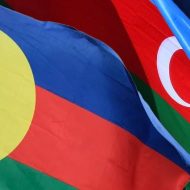
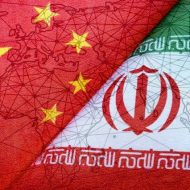
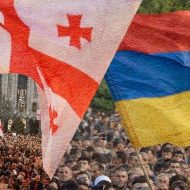
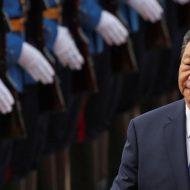
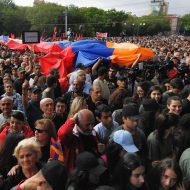
Leave a Reply